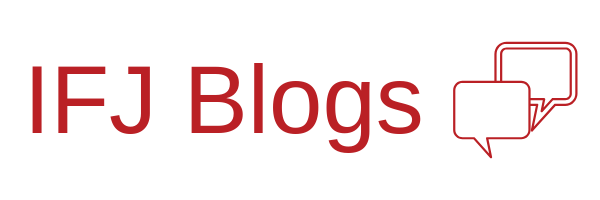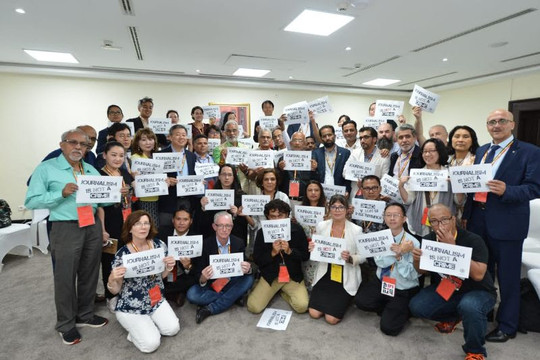
IFJ Congress concludes in Tunisia!
On June 11-14 the IFJ held its 30th Congress in Tunis, Tunisia. The IFJ Congress brought together over 300 journalists and activists from IFJ affiliates across the globe. There were over 30 participants from theAsia Pacific region.
Younes Mjahed from Morocco was elected as the IFJ President, and from the Asia Pacific region - Sabina Inderjit was elected Vice President, Paul Murphy and Ian Chen were elected to the IFJ Executive Committee.
Several urgent motions from the Asia Pacific region were passed at the Congress including:
- Against the attempt to extradict Julian Assange to the USA (read here)
- IFJ condemns raids by Australian Federal Police on Australia media and journalists (read here)
- State of press freedom in the Philippines (read here)
- Attacks on the media covering extradition bill protests in Hong Kong (read here)
- WHO failure to accredit Taiwanese journalists to attend annual meeting (read here)
IFJ launches Kashmir situation report
The IFJ has published a situation report on media freedom and safety in Kashmir. The report documents the growing threats to the media in the Kashmir Valley from both state and non-state actors.
Read the report here
Sri Lankan journalist faces charge over article
On June 16, Sri Lankan journalist Kusal Perera was faced with charges for commenting on the development of religious rivalries after the April 21 Easter Sunday attack. Sri Lanka’s Organised Crime Division reported to the Colombo Magistrate Courts for actions to be taken against Perera under the International Convent on Civil and Political Rights (ICCPR) Act.
Pakistan: Court dismissses charges against journalist in cyber-terrorism case: A local court in Karachi has dismissed all charges against Pakistani journalist, Shahzeb Jillani, who had been accused of cyber-terrorism. The IFJ welcomed the decision which was reached on May 18 after the court said their was insufficient evidence against him. Read more here.
Sri Lanka: Media blocked from meeting probing Easter Sunday attacks: The Sri Lanka media were blocked from live proceedings of the Parliament Select Committee (PSC) on May 29, which was probing the Easter Sunday attacks. The proceedings were open to the public and being broadcast on PEO TV, however the live telecast was suspended. Reports suggested that suspension was due to political interference. Read more here
India: Four journalists arrested over tweet, one released: On June 8, four journalists have been arrested in Uttar Pradesh for sharing a video deemed to be ‘defaming’ the chief minister on Twitter. Read more here.
Sri Lankan journalist released, following week-long detention: In late May, police conducted a search operation of a building owned by Maharoof. He was arrested after police claimed they had found materials of Tawheed Jamath (NTJ) who have been accused of carrying out the Easter Sunday attacks in April 2019. Quickly following his arrest, Maharoof was presented to the courts and placed in police custody. A week later, police reported to the courts that the materials found were not promotional materials for NTJ and were not filing any charges agains Maharoof and he was released on bail. Read more here.
Pakistani journalist’s home stormed by police: According to the police report filed by Shahid Sultan on May 27, at 2.30am on May 24 police stormed his residence. Shahid’s two young son’s had their bedroom door broken, and were brought out of the room at gunpoint by police officers. Shahid was also held at gunpoint. Read more here.
Bangladesh: Activists arrested under internet and digital security law: According to AFP, the three activists who have been arrested were prominent poet Henry Sawpon, lawyer, indigenous rights activist Imtiaz Mahmood and human rights activist Abdul Kaium. Kaium also edits an online news portal in his hometown northern city of Mymensingh.Sawpon and Mahmood were released on bail Thursday. Kaium remains in detention on charges of extortion and defamation under the Digital Security Act 2018. These arrests were the first major arrests under Prime Minister Sheikh Hasina’s new term of government, following her re-election in January. Read more here.

#IFJTunis Philippe Leruth: "You have the future of IFJ in your hands"
Philippe Leruth delivered his last speech today as President of the International Federation of Journalists (IFJ) to the 254 delegates meeting at the World Congress in Tunis. Read the speech here

BuzzFeed journalists just walked off the job in 4 cities. Here’s why: Employees are trying to organize one of the largest labor unions in digital media. Read more here

